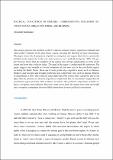Files in this item
Political corruption in Eurasia : understanding collusion between states, organized crime, and business
Item metadata
| dc.contributor.author | Kupatadze, Aleksandr | |
| dc.date.accessioned | 2015-06-03T13:40:02Z | |
| dc.date.available | 2015-06-03T13:40:02Z | |
| dc.date.issued | 2015-05 | |
| dc.identifier | 173231787 | |
| dc.identifier | b141deea-321e-4a15-851d-99e3c14b3d9b | |
| dc.identifier | 84930389363 | |
| dc.identifier | 000353975400004 | |
| dc.identifier.citation | Kupatadze , A 2015 , ' Political corruption in Eurasia : understanding collusion between states, organized crime, and business ' , Theoretical Criminology , vol. 19 , no. 2 , pp. 198-215 . https://doi.org/10.1177/1362480615574404 | en |
| dc.identifier.issn | 1362-4806 | |
| dc.identifier.uri | https://hdl.handle.net/10023/6742 | |
| dc.description.abstract | This article presents the problem of illicit collusion between states, organized criminals and white-collar criminals in the post-Soviet region, showing the blurring of these phenomena. It charts the development of political corruption and argues that this is a particular problem in the region due to the way state resources were sold off during the 1990s. The article however shows that the countries of the region now diverge significantly in terms of the extent and form that collusion takes. The goal of the article is to understand this variation. The article suggests that roughly two broad categories of state now exist in the post-Soviet region, excluding the Baltic States. These are broadly politically competitive states such as Ukraine, Moldova and Georgia and broadly politically non-competitive ones such as Russia, Belarus or Kazakhstan. I show that collusion takes differing forms across these categories due to the effect that the presence or absence of political competition has. In conclusion I argue that the post-Soviet region provides little evidence to believe that political competition actually reduces corruption and collusion. However, some cases from the region show that successful anti-corruption campaigns are more likely where there is more political contestation. | |
| dc.format.extent | 245179 | |
| dc.language.iso | eng | |
| dc.relation.ispartof | Theoretical Criminology | en |
| dc.subject | Collusion | en |
| dc.subject | Corruption | en |
| dc.subject | Organized crime | en |
| dc.subject | Political competition | en |
| dc.subject | Post-Soviet | en |
| dc.subject | JZ International relations | en |
| dc.subject | SDG 16 - Peace, Justice and Strong Institutions | en |
| dc.subject.lcc | JZ | en |
| dc.title | Political corruption in Eurasia : understanding collusion between states, organized crime, and business | en |
| dc.type | Journal article | en |
| dc.contributor.institution | University of St Andrews. School of International Relations | en |
| dc.identifier.doi | 10.1177/1362480615574404 | |
| dc.description.status | Peer reviewed | en |
This item appears in the following Collection(s)
Items in the St Andrews Research Repository are protected by copyright, with all rights reserved, unless otherwise indicated.

